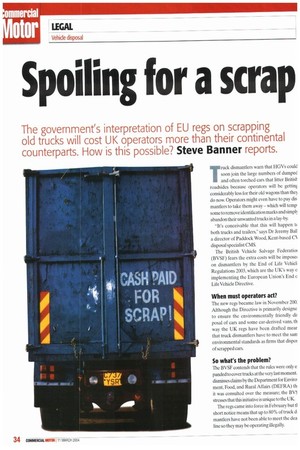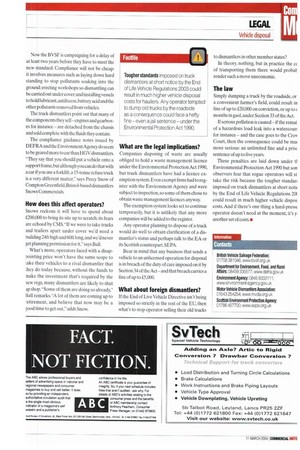Spoiling for a scrap
Page 34

Page 35

If you've noticed an error in this article please click here to report it so we can fix it.
Tnick dismantlers warn that HGVs could soon join the large numbers of dumped and often torched cars that litter British roadsides because operators will be gettini considerably less for their old wagons than the) do now. Operators might even have to pay dis mantlers to take them away — which will temp. some to remove identification marks and simpl■ abandon their unwanted trucks in a lay-by.
"It's conceivable that this will happen tc both trucks and trailers." says Dr Jeremy Ball a director of Paddock Wood, Kent-based C\ disposal specialist CMS.
The British Vehicle Salvage Federatim (BVSF) fears the extra costs will be impose, on dismantlers by the End of Life Vehict Regulations 2003, which are the UK's way o implementing the European Union's End c Life Vehicle Directive.
When must operators act?
The new rep became law in November 200: Although the Directive is primarily designe to ensure the environmentally friendly di! posal of cars and some car-derived vans, th way the UK regs have been drafted mear that truck dismantlers have to meet the sarn environmental standards as firms that dispel; of scrapped cars.
So what's the problem?
The BVSF contends that the rules were only e panded to cover trucks at the very last moment. dismisses claims by the Department for Envira meat, Food, and Rural Affairs (DEFRA) th it was consulted over the measure; the BV stresses that this initiative is unique to the UK.
The regs came into force in February but ti short notice means that up to 80% of truck d mantlers have not been able to meet the dea line so they may be operating illegally. Now the BVSF is campaigning for a delay of at least two years before they have to meet the new standard. Compliance will not be cheap: it involves measures such as laying down hard standing to stop pollutants soaking into the ground; erecting workshops so dismantling can be carried out under cover; and installing vessels to hold lubricant,antifreeze,battery acid and the other pollutants removed from vehicles.
The truck dismantlers point out that many of the components they sell — engines and gearboxes for instance — are detached from the chassis and sold complete with the fluids they contain.
The compliance guidance notes issued by DEFRA and the EnvironmentAgency do seem to be geared more to car than HGV dismantlers. "They say that you should put a vehicle onto a support frame, but although you can do that with a car if you use a forldift, a 15-tonne refuse truck is a very different matter." says Percy Snow of Compton Greenfield.Bristol-based dismantlers Snows Commercials.
How does this affect operators?
Snows reckons it will have to spend about £200,000 to bring its site up to scratch; its fears are echoed by CMS. "If we were to take trucks and trailers apart under cover we'd need a building 24ft high and 60ft long, and we'd never get planning permission for it," says Ball.
What's more, operators faced with a disappointing price won't have the same scope to Lake their vehicles to a rival dismantler that they do today because, without the funds to :nake the investment that's required by the jew regs, many dismantlers are likely to shut shop. "Some of them are doing so already," Ball remarks. "A lot of them are coming up to -etirement, and believe that now may be a ;ood time to get out," adds Snow. Facifile es Tougher standards imposed on truck dismantlers at short notice by the End of Life Vehicle Regulations 2003 could result in much higher vehicle disposal costs for hauliers. Any operator tempted to dump old trucks by the roadside as a consequence could face a hefty fine -even a jail sentence under the Environmental Protection Act 1990.
What are the legal implications? Companies disposing of waste are usually obliged to hold a waste management licence under the Environmental Protection Act 1990, but truck dismantlers have had a licence exemption system. Even exempt firms had to register with the Environment Agency and were subject to inspection,so some of them chose to obtain waste management licences anyway.
The exemption system looks set to continue temporarily, but it is unlikely that any more companies will be added to the register.
Any operator planning to dispose of a truck would do well to obtain clarification of a dismantler's status and perhaps talk to the EA or its Scottish counterpart. SEPA.
Bear in mind that any business that sends a vehicle to an unlicensed operation for disposal is in breach of the duty of care imposed on it by Section 34 of the Act — and that breach carries a fme of up to £5,000.
What about foreign dismantlers?
lithe End of Live Vehicle Directive isn't being imposed so strictly in the rest of the EU, then what's to stop operator selling their old trucks In theory, nothing, but in practice the cc of transporting them there would probat render such a move uneconomic.
Simply dumping a truck by the roadside, or a convenient farmer's field, could result in fine of up to £20,000 on conviction, or up to t months in gaol, under Section 33 of the Act.
If serious pollution is caused — if the remai of a hazardous load leak into a watercoun for instance — and the case goes to the Croy Court, then the consequence could be mu( more serious: an unlimited fine and a prig sentence of up to five years.
These penalties are laid down under tl Environmental Protection Act 1990 but son observers fear that rogue operators will st take the risk because the tougher standan imposed on truck dismantlers at short noti■ by the End of Life Vehicle Regulations 20( could result in much higher vehicle dispos costs. And if there's one thing a hard-press( operator doesn't need at the moment, it's y another set of costs. •
































































































































































































